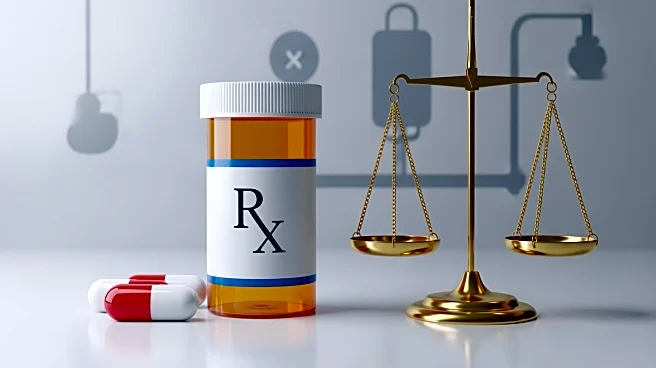What's Happening?
The Trump administration is in the final stages of negotiating deals with pharmaceutical companies Eli Lilly and Novo Nordisk to offer their obesity drugs at a significantly reduced price of $149 per month. These agreements aim to make medications like
Wegovy, Zepbound, and Mounjaro more accessible to consumers, particularly Medicare beneficiaries. Currently, these drugs have list prices ranging from $1,000 to $1,350, but the actual cost to consumers varies based on insurance and discounts. President Trump is expected to announce the deals soon, although they are not yet finalized, and key policy details are still being worked out. The initiative is part of a broader effort by the White House to reduce drug prices through individual agreements with pharmaceutical manufacturers.
Why It's Important?
The potential agreements with Eli Lilly and Novo Nordisk could significantly impact the affordability and accessibility of obesity drugs for Medicare beneficiaries. By lowering the cost of these medications, the Trump administration aims to address the high prices that have been a barrier for many consumers. This move could also expand the market for these drugs, which have gained popularity for their effectiveness in weight loss and managing chronic conditions. The initiative reflects a strategic approach to drug pricing, leveraging direct deals with manufacturers to achieve cost reductions. If successful, this could set a precedent for future negotiations and influence drug pricing policies across the healthcare industry.
What's Next?
If the deals are finalized, President Trump is expected to announce them soon, potentially leading to changes in Medicare coverage for obesity drugs. The agreements are linked to a pilot program by the Centers for Medicare and Medicaid Services (CMS) aimed at capping drug costs for some beneficiaries. The administration's approach may prompt reactions from various stakeholders, including healthcare providers, insurers, and patient advocacy groups. Additionally, the deals could influence ongoing debates about Medicare and Medicaid coverage for expensive medications, with implications for future policy decisions.
Beyond the Headlines
The negotiations highlight the ethical and policy challenges in balancing drug affordability with pharmaceutical companies' interests. The Trump administration's focus on GLP-1 medications underscores the growing demand for effective weight loss solutions amid rising obesity rates. The initiative may also spark discussions on the role of government in regulating drug prices and ensuring equitable access to healthcare. Long-term, these developments could contribute to shifts in healthcare policy and influence the pharmaceutical industry's pricing strategies.















